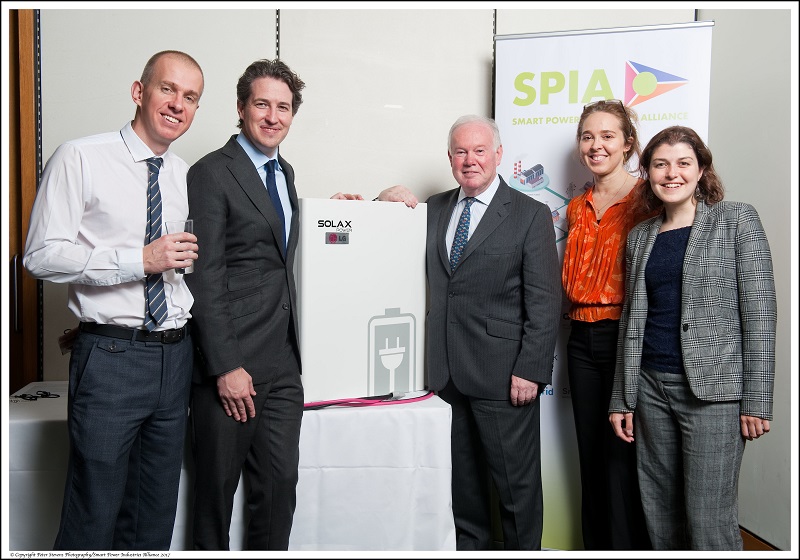
Leading trade bodies from the UK’s renewables sector have united to form the Smart Power Industries Alliance (SPIA) in a bid to support the transition to a smarter, more agile power system.
The cross-sector alliance has been formed by the likes of the Renewables Energy Association, Solar Trade Association, Energy UK and the Electricity Storage Network to work alongside the system operator National Grid.
Solar Power Portal understands that SPIA has been in the works for around a year, with solar set to play a crucial role as the technology nears grid parity. The Solar Trade Association's head of external affairs Leonie Greene has been at the forefront of the alliance's formation with other trade associations championing the cause.
Leading the initiative will be former energy minister Charles Hendry. Speaking at a launch event held in Westminster yesterday, Hendry said that SPIA promised to be a “unique gathering” bringing together representatives from across the energy industry.
Hendry added that the alliance welcomed this month’s Clean Growth Strategy, a document he said “reconfirmed the direction of travel”, and outlined SPIA’s role to help the government delivery on that strategy.
“This is the chance for the UK to be a leader in energy, but it does mean we have to work together to predict and overcome the challenges that will be there,” he said.
SPIA’s stated aim is to demonstrate the “positive consensus” for smart power across the entire electricity industry and also communicate the benefits of smart power with the general public.
To do so it has developed a list of five key asks for both government and energy regulator Ofgem, including;
- Putting consumers at the heart of energy policy by enabling households to play an active role in the energy system;
- To facilitate the creation of new markets for smart services, ensuring that all participants can compete on equal terms;
- Taking a whole-system approach to power by creating incentives for heat, transport and power sectors to collaborate more effectively;
- Accelerating the smart power transition by providing consistent policy and regulatory direction, and;
- To make smart power a central cog within the industrial strategy, providing incentives for key sectors to invest in smart technologies.
Hendry also gave his opinion that the future power market would be defined less by natural resources, and more by technology and how it is deployed.
“The whole way we look at the market and our energy system is going to change. That means that we have a real focus on the determination to become a low carbon society and we need to do that in a way that engages consumers, but part of our focus has to be as well that we do this at the lowest cost, and how we drive forward the change that’s going to be necessary. That will need the government, industry and consumers working together.
“This is not something that’s unique to the United Kingdom, these are discussions that are happening in every country regardless of the state of their development.
“If we can do something here in the UK that gives them a real advantage, and helps us to move ahead of the crowd, then we have something we can show from the innovation of the UK and contribute to others,” Hendry added.
SPIA has received cross-party support from government and the launch event also heard from Labour MP Chi Onwurah and Conservative MP, and former BEIS select committee member, James Heappey, who said his top priority for government would be to remove barriers to demand management.
Smart Power Industries Alliance launch is Who's Who of UK clean tech industry. Grt to see such expertise togethr & pushing in same direction pic.twitter.com/o3gUYQ1a5i
— James Heappey MP (@JSHeappey) October 23, 2017
The event also heard from energy market experts including Imperial College London’s Goran Strbac and Laura Sandys, who urged regulators to “drop the past” and open the power market up to other sectors.
Sandys, who most recently co-authored a report calling for a drastic re-think of power market regulation, said it was time the industry faced up to the fact that most consumers were “not all that interested” in the finer details of energy, insisting that most consumers would require automated decisions to be made for them.
Her sentiments were echoed by Origami Energy chief executive Peter Bance, who said he wanted regulators to “let rip” and allow problems such as demand spikes to emerge and, crucially, technological innovators the room to come in and provide solutions.
The full list of organisations involved in the launch includes; The Energy Networks Association, The Association for Decentralised Energy, The Renewables Energy Association, Energy UK, RenewableUK, Scottish Renewables, The Solar Trade Association, BEAMA, SmarterUK, The Electricity Storage Network and National Grid.

